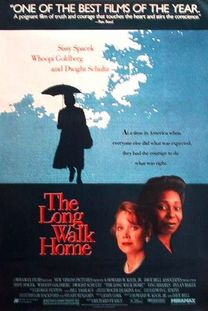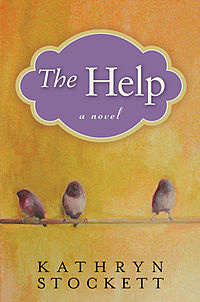 The Long Walk Home, is a favorite of films regarding the 1950s American South. The storyline brings two women together to both play a part in the Civil Rights Movement. One of the women is Miriam Thompson, who is a white, upper middle class housewife with two daughters; the youngest, Mary Catherine, is seven years old. Her sister, Sarah, is in college. The scenes begin with a Montgomery Alabama bus (1955) pulling up for three black women (all are domestic workers) to board. They walk with backs straight, put their money into the bus meter, then walk out and along the side of the bus to enter at the back. One of the maids, Odessa Carter, works for Mrs. Norman Thompson. Mary Catherine's voice-over describes Odessa, "I called her Dessy. As best as anyone knows, she was the first woman to rock me to sleep. There wasn't anything extraordinary about her. But, I guess there's always something extraordinary about someone who changes and then changes those around her." Odessa arrives to the Thompson's family enclave, seasoned with its 1950s space age furniture, to meet her usual morning scene. Sarah is looking for her tennis racket so she can meet her boyfriend at the club, Norman asks Miriam to have his golf clubs repaired, as he is heading out to work, and Miriam asks Odessa to take Mary Catherine to the park, as there is to be a cocktail party thrown later that night. Miriam drives Mary Catherine, Odessa and two of Mary Catherine's friends to Oak Park. Odessa sits in one of the back seats. Miriam drops off Odessa and the girls, telling Odessa to meet her at the same spot at 3p.m., as she should be back from the beauty parlor by then. The girls run and play, while Odessa puts lunch together. Then, a Montgomery Alabama police officer comes along. He is very tall and big, and as the children look on, he loudly informs Odessa the park is for whites only. Odessa and the children have to leave. Miriam is incensed at the story of the children and maid's experience in Oak Park and she calls the police office to complain of the incident. It appears her husband (or father) carries a reasonable amount of weight in town as the officer comes to apologize, that very afternoon, to both the maid and the children. Later that evening, at the cocktail party, Norman's brother, Tucker, hears about how his sister-in-law had the officer come out and apologize for what he did to Odessa and the girls in the park. Tucker tells Miriam, that for a white officer to have to express regret or demureness, to a black maid is, "juus plein ol' wrrong." Miriam becomes irate Tucker should judge her on any given moral synopsis, and responds to his stated perspective by telling him, she knows what is right and knows what is wrong, and she is not to be second guessed by a "wet behind the ears patrolman," nor by Tucker. She then walks off and Tucker can think of no better reply in turn other than to tell his brother he always thought Miriam was a, "hellcat." Some time went by before an event occurred that really brought Odessa and Miriam together as people: the arrest of Rosa Parks and the boycott of the Montgomery Alabama buses by the African American populace. Parks was the second African American woman arrested for refusing to give up her seat for a white person. And so, the boycott begins. Some black people had cars, but most did not. And this meant two things: 1. A lot more walking 2. Carpools The morning after the boycott is announced, the buses roll by Odessa's family home, "That bus is as empty as my grave," Odessa remarks of one going by. Odessa has three children of her own, one girl and two boys. The youngest of the boys asks, "Mom, if we can't ride the bus, do we have to go to school?" Odessa responds with, "Boy, you ain't never took the bus in your life..." With the boycott comes friction at work for Odessa sometimes arrives late and moves slow as she is tired from the lessened hours of sleep and all the walking. She even has bloodstains on her socks from poor walking shoes. Odessa cannot take the bus, even if she would like to, as a black person taking the bus by themselves is liable to attract a dangerous amount of attention in a small city where white police cannot be relied upon to protect the black community. The boycott causes increased debates among both the black and white populaces. After walking miles and cleaning house all day, Odessa attends weekday night Church meetings, where the voice of Martin Luther King is heard over the loud speaker saying, "the only weapon we have in our hands this evening is the weapon of protest. That's all..." Odessa, despite her innately strong work ethic begins to drag around Christmas time. Miriam feels bad and both out of empathy and as a business measure, she agrees to give Odessa a ride from Curb Market, twice a week in the mornings. Mary Catherine is a witness to the carpool agreement between the two women. Miriam informs her daughter, the matter is a secret between them, so there is no need to tell Daddy. Christmas comes and Odessa, has in her pocket a little gift for Mary Catherine, the same size as the gifts Odessa gave her own children. Though, when Mary Catherine runs up to Odessa to show off her fancy new doll, Odessa puts the little gift back in her pocket. Mary Catherine will never know Odessa bought her a gift for that Christmas day. Odessa walks home after serving the Thompson's their Christmas, and she walks because it means giving her children a better place in the world. Miriam decides to aid the boycott and carpools even further, perhaps to give her own children a sweeter future, and for herself. Miriam has a good, loving husband, but as time goes by their distance grows over their perspectives of Odessa's place in their family. Miriam becomes part of the underground carpool movement: white women giving rides to African American, mostly domestic workers, in an organized pick up and drop off venue. The carpool is crashed by white southern male fundamentalists, one of whom is Miriam's husband, and Miriam is caught in the act of aiding the Civil Rights Movement. Her car is vandalized while Mary Catherine looks on in tears and Miriam's own husband stands by, hopeless to make it stop. Tucker, who is at the scene, tells Miriam that she has lost this one. Miriam turns right around and in true spitfire fashion, tells Tucker,"Go to hell, you ignorant sonofa-," and she gets slapped across the face for it. But she stays. Her husband finally comes to Miriam's physical protection but it is obvious, she and Norman are on two different sides of one line. The women of the carpool, mainly African Americans, begin to sing in response to the white men's chants of "walk n-r walk, walk n-r walk." The women stand their ground and they sing a hymn. By Sarah Bahl  The Help, (2009) by Kathryn Stockett is a portrayal of life in early 1960s Jackson, Mississippi. The focus is on the relations between white women and those "of color." The novel is written from three perspectives. The first voice is Abileen, a black maid working for the Leefolts, a white family, that is undergoing financial strain. Abileen is calm, intelligent and caring. She has worked for white families, nurturing and raising their children for much of her life. She is in her 60s and has cared for white child after white child, most of whom grow up to be as racist as their fathers and mothers. The second perspective is Minny, a maid as well, with an alcoholic husband who beats her the same as her father used to during her childhood. Minny is vivacious, portly, and has trouble keeping a job in Jackson because of her tendency to respond frankly to her white bosses. She has children, a husband, and she spends all day cleaning other people's houses. There are woman in Jackson Mississippi, who are ready for change, such as a perfectly made bonfire, just waiting for a match. Skeeter (third) is 23 and as an ambitious writer, she craves freedom away from 1960s plantation life and her mother, who thinks she can make up for her own petty life by overly controlling her daughter, with comments and suggestions to improve her looks, so as to find a husband, in a manner meant to be "helpful." Skeeter smokes, and applies for writing/editorial jobs, not in Mississippi. She hears back via mail from an Elaine Stein, Senior Editor at Harper and Row Publishers. And so the change begins. Skeeter compiles a narrative of stories based on the lives of maids in Jackson. As a result, she becomes outcasted from every white person in the small city, with the exception of her family. Her mother is direly ill and her father runs the plantation, as a shell of a person, unable to believe his wife is dying. Skeeter is able to move to New York and begin her career with the help of a trust fund, once the book is published. The book's capital income is divided 13 ways because of the number of people whose stories Skeeter used. The Help reveals the maids of 1960s suburban Southern life are not ghosts meant to care for white people; but that they are people themselves, with thoughts, feelings and faults of their own. Some of the novel I was uncertain of in terms of racial representation because the author, Stockett, wrote the black characters according to phonetic diction while the white characters' southern accents are written in Standard American English. Also, with the African American narration, there are differences in wording while all white dialect is written in SAE. Rosa Parks (born 1913), a black Alabama seamstress, spoke in SAE. Is Stockett credited to know what African American speech would have been like at that time and place in history? The "white trash" character, Celia Foote, from The Help speaks in SAE rather than Southern American English. So, if Celia is speaking in SAE, why are the working class African American characters speaking in what seems a version of African American Vernacular English, (using double negatives and keeping intransitive verbs without converting them to third person singular) rather than SAE? The whole book should be written according to dialect for both black and white characters, or else all in SAE. By Sarah Bahl |
Archives
June 2017
Categories
All
|
 RSS Feed
RSS Feed